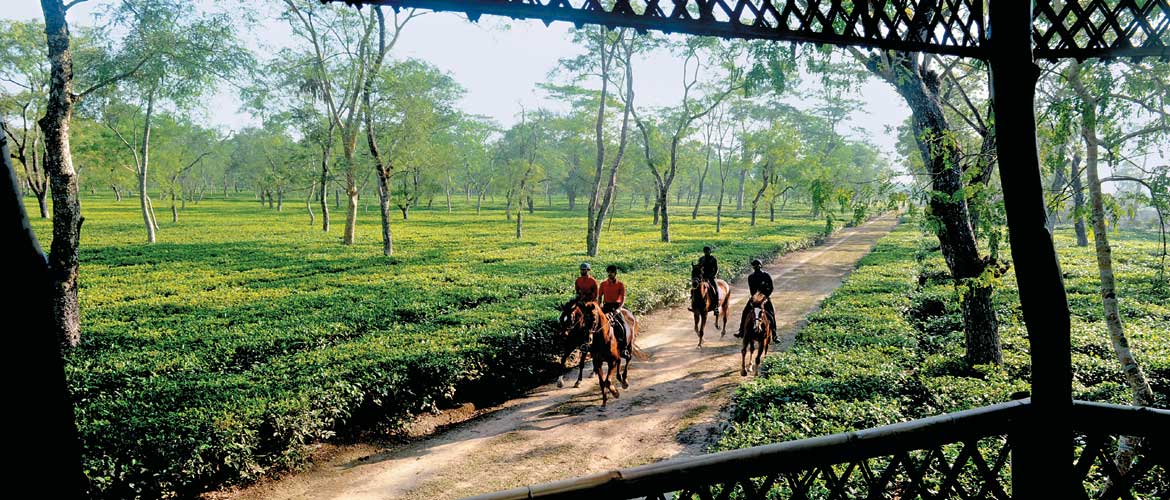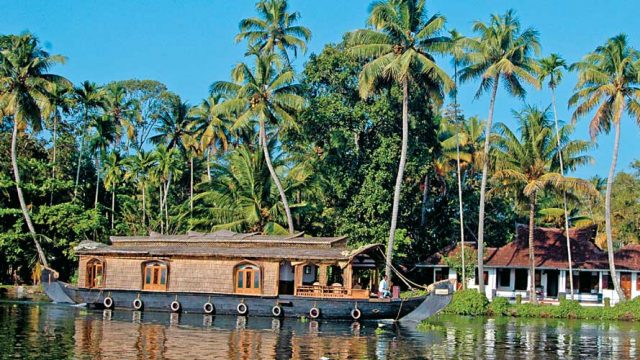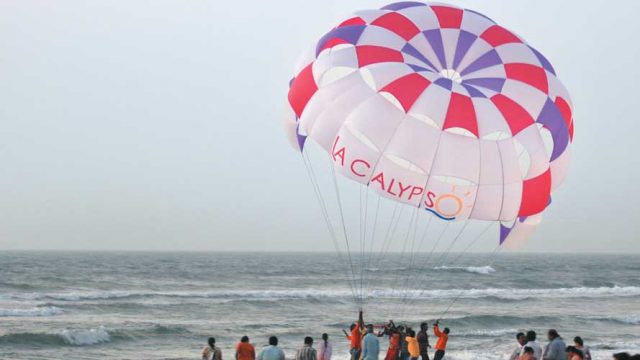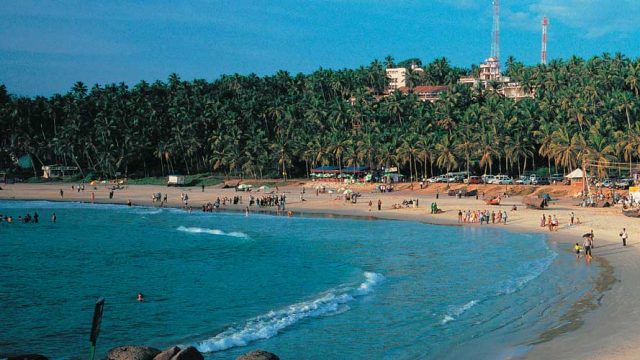Situated on the northern-most tip of Assam, Dibrugarh is India’s original tea country. Acres of
Dibrugarh acts as the perfect gateway to Assam’s tea districts. The districts of Dibrugarh, Tinsukia and Sivasagar collectively account for 50 per cent of India’s Assamese tea crop. A drive around Dibrugarh shows fecund tea plantations flanking every road. The umpteen shades of green in a single expanse of a tea garden are bemusing.
Another defining characteristic of Dibrugarh, and indeed of most Assamese cities, is the Brahmaputra. No matter where you are, the river bank is never too far away and the city’s, and its people’s fates and fortunes seem to be inextricably linked with the river and its mercurial nature. A testament to this is the tale of the Medong earthquake of 1950, which changed the course of the river. More than three-quarters of the town was annihilated by the river’s fury. The town has since been re-built, and the people of Dibrugarh still live in the Brahmaputra’s shadow, constantly reminded of the river’s powers – both to nurture and destroy.

HISTORY
This district is believed to have been a major military encampment of the Ahom kings during the Ahom-Sutiya War. The advent of the British in this region saw its transformation into an important centre for administrative in the Upper Assam area. However, during World War II, the town was converted into a military base once more, and was primarily used as a transit camp for evacuees from Burma. After independence, the Dibrugarh sub-division was made into a district. After the secession of the Tinsukia sub-division in 1989, Dibrugarh came to resemble its present form.
ORIENTATION
Dibrugarh is serviced by the Mohanbari Airport, around 15km away from the city centre. It also boasts of an illustrious place in the history of the Indian Railways. It was here that the first railway service in the Northeast had started.
Today, there are two train stations in the city, Dibrugarh Town and New Dibrugarh Railway Station, both of which play an important part in the Indian Railway system. The latter is the biggest railway station in the entire Northeast. Buses, cycle rickshaws and shared auto rickshaws are the main modes of transport within the city.
Rough-and-ready ferries cruise daily to the Bogibil Ghat, the shores of Brahmaputra river on the side of Arunachal Pradesh. A bus from here ferries one to Pasighat. Departure times depend on the Brahmaputra’s water level. Many hotels in Dibrugarh sell 4WD-ferry-4WD combination tickets (per person ₹300) for travel to Pasighat.

THINGS TO SEE AND DO
Assam’s original tea city, Dibrugarh has some great experiences in store for visitors, be it a village walk, tea plantation visit or birdwatching in a reserve forest.
Tea Holiday
One of the great pleasures of visiting Dibrugarh is in getting a chance to live the high life of a tea estate manager. Picture the setting – a heritage bungalow amidst an expansive emerald green tea estate, stretching as far as the eyes can see. Watch a Bihu performance in the evening, sip endless cups of Assamese tea, read a book and then unwind. This experience can be enjoyed at Dibrugarh, courtesy Purvi Discovery – a travel agency run by the Jalan Group.
One of the oldest tea growing families in Assam, the Jalans have recently converted a few of their manager’s bungalows into guest-houses. Mancotta Heritage Chang Bungalow and Chowkidinghee Heritage Chang Bungalow, their two properties in Dibrugarh, are open to guests all year round. A stable of over a dozen thoroughbreds offer riding as well.
The bungalows give an idea of what life was like a century ago. Talking about architecture, there is an amalgamation of Assamese and Colonial influence. The most well-thought out aspect of the cottages, is the huge size of windows, each one of them looking out to beautiful sceneries. Those who wish to just relax will find this the most perfect retreat. For those looking for a more packed itinerary, Purvi Discovery has plenty of activities planned around the estate.
The sopoforic charms of these places make it easy to forget that one is in the middle of a tea estate. Factories hum with the business of rolling, firing and sorting. The tea is packed, labelled and shipped to auction houses in Guwahati from where they find their way to all corners of the world.

Radha Krishna Temple
The Radha Krishna temple, situated amidst lush, expansive gardens, is located close to the Assam Medical College. Also known as the Jalan Mandir, the main sanctum sanctorum’s façade is made of white marble. As is revealed by the name, it features two life size idols of Radha and Krishna. There are also two smaller temples dedicated to Mahashakti and Lord Shiva here.
WHERE TO STAY AND EAT
There is plenty of accommodation in Dibrugarh. Dibrugarh Club House (Cell: 09706054107; Tariff: ₹1,999–4,999) on AT Road is one of the best places to stay here. Other options on AT Road include Hotel Devika (Tel: 0373-2325956, 2324756, Cell: 07896636157; Tariff: ₹880–1,825); Hotel Little Palace (Tel: 2328700-03, Cell: 09864231830; Tariff: ₹1,200–12,000) and Hotel Rajawas (Tel: 2323307, 2324303, Cell: 094010 30551; Tariff: ₹1,398–4,677) have all basic amenities.
City Regency Hotel (Cell: 09207015669, 09854012430; Tariff: ₹2,400–9,000) and Hotel Indsurya (Tel: 326322, 2324415; Tariff: ₹980–4,500) are on RKB Road; Hotel Natraj (Tel: 2327275; Tariff: ₹1,800–9,000) is on HS Road.
Mancotta Heritage Chang Bungalow (Tel: 230110, 230035; Tariff: ₹7,500–8,500) and the Chowkidinghee Heritage Chang Bungalow (Tel: 230110, 230035; Tariff: ₹7,500) are located in the midst of a tea garden. Bookings can also be done through Help Tourism (Kolkata Tel: 033-24550917, 24549719; W helptourism.net).
In most cases all hotels will have their own restaurants. The Dibru-garh Club House has the best eatery and bar in town. Hotel Natraj is also quite popular. KF is a new eatery in Thana Chariali. Nearby are Surbhi and Flavours, both local favourites. Madhumita’s is a fast food joint in Santipara. Riddhi on RKB Road serves good Chinese, Indian and Continental. H2O is a bar restaurant on Mancotta Road. Dihing, a traditional Assamese Restaurant, in front of Chowkhidinghee Field, near DC Bungalow is also a good option.

Around Dibrugarh
Dibru Saikhowa NP (90km)
Created especially for the conservation of the rare and endangered white-winged wood duck, the Dibru Saikhowa National Park now houses numerous species of endangered mammals, reptiles and birds. Records show that over 25 per cent of India’s threatened bird species have been bred here, which accounts to about 502 in number.
Till date, 36 species of mammals, 104 species of fish, 43 species of reptiles, 105 species of butterflies and 680 species of plants have also been recorded here.
Spread over an area of 650sq km, the National Park is located in the eastern border of Assam, touching Dibrugarh and Tinsukia districts. An identified IBA (Important Bird Area), the National Park had become the ninth biosphere out of a total 18 across India, in 1997. Earlier called Dibru Reserve Forest and Saikhowa Reserve Forest, this area was notified as a wildlife sanctuary in 1986, and a national park in 1999.
For wildlife lovers, the park is also home to nearly 50 feral horses, which can be spotted in the northern part of the park at the Churkey Chapori area. Other animals spotted here includes sambar, sloth bear, dhole, small Indian civet, Malayan giant squirrels, Chinese pangolin, capped langur, elephant, wild boar, hoolock gibbon, hog deer and barking deer. If your luck holds, you might even spot one of the big cats – a royal Bengal tiger or a leopard – or the relatively rare Gangetic river dolphin gambolling in the water.
Tip Hiring a local guide is highly recommended
One of the 19 biodiversity hot-spots in the world, Dibru Saikhowa National Park comprises tropical moist deciduous forests, tropical semi-green forests, Salix swamp forests, grasslands and canebrakes. The park is bounded by the Brahmaputra river, Lohit river and Arunachal Hills in the north and Dibru river, Debang river, Dibru and Patkai hills in the south, making for beautiful and verdant surrounds.
Although accessible round the year, the best time to visit this park is late winter and monsoon. The park may also close during heavy rain, without prior notice.
There are two entry points to the park. One is the Guijan Ghat entry point and the second one is the Saikhowa Ghat or Dhola entry point. The former is about 10km from Tinsukia and Saikhowa Ghat/ Dhola entry point is about 50km from Tinsukia.
Entry Indians ₹100; Foreigners ₹500 Timings Sunrise to sunset Photography Indians ₹50; Foreigners ₹500 Videography Indians ₹500; Foreigners ₹1,000
Boat Safari
Exploring the Dibru Saikhowa National Park is an experience second to none. There are no elephant or jeep safaris here and visitors have to hire a local boat to explore the park. Skimming across the water, you are also likely to spot Asiatic water buffalos basking in the sun by the muddy banks, turtles swimming past and groups of storks fishing in the water.
Trekking
Trekking is another rewarding way of exploring this park. The jungle is quiet, far away from the cacophony of the city, and the stillness is only broken by the rustle of dry leaves beneath your feet or the chorus of birdcalls. Your guide will lead you down the trails.
It is also possible to explore the two villages inside the park, Dhadia and Laika and see how the locals live. Or you could head to Maguri Beel adjacent to the park where a variety of birds can be spotted.
Written permission from the Park Authority is required to enter Dibru Saikhowa National Park. Indian nationals pay ₹100 as entry fee while foreigners pay ₹500.
WHERE TO STAY AND EAT
You may stay at Banashree Eco Camp (Cell: 09435335462, 099545 94940; Tariff: ₹1,200 per person, with meals) located near the park periphery in Guijan. Meals served are Indian. Another good eco-camp is Wave Eco Camp (Cell: 09954791573, 09707702040; Tariff: ₹1,000 per person, with meals) in Rangagara. An interesting way to explore Dibru Saikhowa is to stay at the Om House Boat (Cell: 09401100999, 08876907039;W omhouseboat.com). You may opt for a one-night package (Tariff: ₹1,500 per person, with evening snacks and dinner) or Feral Horse package (2D/ 1N; Tariff: ₹3,500 per person, with meals). Day packages (Tariff: ₹1,000 per person, with breakfast, lunch and evening snacks) are also available.
FAST FACTS
When to go October–March
Tourist Office
Directorate of Tourism, Govt of Assam, Station Road, Guwahati, Tel: 0361-2547102, 2544475
W assamtourism.gov.in, STD code 0373
For Dibru Saikhowa NP
When to go November–April
Tourist/ Wildlife Offices
Tourist Information Office, Tinsukia, Cell: 09954292052, W assamtourism.gov.in
Divisional Forest Officer, Wildlife Division, Tinsukia, Cell: 09435171721, STD code 0374
GETTING THERE
State Assam
Location On the southern bank of the Brahmaputra, in the northern part of the state Distance 443km NE of Guwahati Route from Guwahati NH37 via Nagaon, Kaziranga NP, Jorhat and Gaurisagar
Air Mohanbari Airport at Dibrugarh (14km/ 30mins) is connected to New Delhi, Kolkata and Guwahati by Air India, Indigo and Jet Airways. Taxi to the city centre charges approx ₹1,000
Rail Dibrugarh Town and Dibrugarh are two railway stations serving the city. Important trains that connect Dibrugarh to New Delhi, Kolkata, Bengaluru, Chennai, Kanya Kumari, Thiruvananthapuram, Amritsar, Chandigarh and Guwahati are Rajdhani Express, Vivek Express, Brahmaputra Mail, Kamrup Express, Dibrugarh-Chennai Egmore Express, Dibrugarh-Bangalore Express, Amritsar-Dibrugarh Express, Chandigarh-Dibrugarh Express
Road NH37 connects Dibrugarh with Guwahati and the rest of India Bus From all over the state and neigh-bouring states come to Dibrugarh
The Northeast Guide
Assam
Dibrugarh





